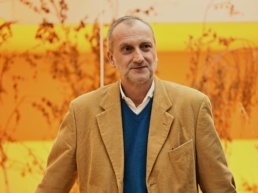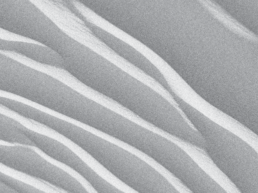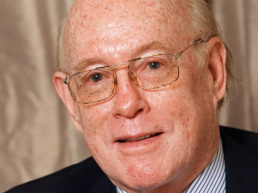2020 was a year, at least, atypical also for the activity of the Foundation, but during which much was achieved. Rita Faden, the president of FLAD, evaluates the activity throughout this year that has now ended, and shares the Foundation’s goals for 2021, with a message of hope and determination.
2020 was an atypical year. What marked FLAD’s performance?
The ability it had, in a relatively short time, to identify the problem and act. Much of FLAD’s normal activity – providing grants, supporting trips to the United States –, has become impossible with the pandemic. We realized this quickly and, since we had an available budget due to the impossibility of maintaining our normal activity, it made sense to redirect this support to social responsibility actions, and also to support scientific research around Covid-19.
I think we have done it well and in a diverse way, supporting the Portuguese Food Bank Against Hunger, speeding up the national manufacture of medical shields at a time when there were no masks yet and we distributed them to nursing homes, firefighters, and security forces, but also supported the creation of a biobank of Covid-19 patient samples by the Instituto de Medicina Molecular (IMM), and endorsed the CASA Porto, dedicated to the homeless, Caritas Azores, and other associations that work in the area of social support.
Moreover, if there is a theme that the pandemic has made particularly evident, mental health and the need to develop research in this area were undoubted. That is why we launched the FLAD Science Award Mental Health, aimed at clinical research in the area of mental health, with a prize of 300.000 euros.
The pandemic, on one hand, pushed us into unprecedented isolation. And at the same time, we all feel a tremendous vulnerability, worry, distress, and anxiety, as a result of the constant concern with our health and that of our family.
I think many people realized for the first time that they were vulnerable to specific mental health issues. It must also be taken into account, that for many people who were already facing difficulties, there has been a worsening of their condition. Supporting clinical research in the area of mental health was already important, but it became fundamental.
Despite the limitations, what other projects could be implemented?
It is important to point out that we immediately decided to maintain all the foreseen support, even when many of the initiatives transitioned into the online format, because all organizations are cost-effective, and we considered it important to maintain the promised support.
On the other hand, we were able to move forward with many of the projects we had originally considered. Despite the postponements, we inaugurated in September the exhibition “Feast. Fury. Femina – Works from FLAD’s Collection”, in the Central Tejo from Maat. It was my intention, since I took office, to take care of the collection, to look after it, to continue it, but also to show it to the public.
We have moved forward with other important initiatives to promote information and debate around the US elections. Of course, it was not possible to make an election night as planned, opening the doors of FLAD and our auditorium, but the essential point was to familiarize people with the electoral process, which is very different from ours, and give them the necessary basics to follow the process in an informed way. We supported a newsletter by the Observador, the development of a podcast by TSF, the preparation of a magazine dedicated to the elections by SÁBADO and we held two webinars to discuss the electorate behavior and the forecasts and polls, in partnership with SIC/Expresso.
These projects, together with support for the development of a newsletter of the Açoriano Oriental and a version of PGlobal in English, reflect an important support to the media in the difficult moment that crosses this sector so important for Democracy, while helping to inform Portuguese society on fundamental themes of American life and to give an account to the community in the US of what is happening in Portugal.
Something I particularly enjoyed was the launch of FLAD’s first podcast, the Atlantic Talks, conducted by journalist Filipe Santos Costa. While celebrating FLAD’s 35th birthday, we wanted to create a space for reflection on the influence of the US in Portugal in different areas – culture, politics, science, cuisine, or music – with a broad and varied perspective that created very interesting conversations. These have allowed us to understand different perspectives of this influence of the US, and that in fact in most of these areas it has a constant presence and influence in Portugal, and that we have now turned into a book.
We also maintained the FLAD Science Award Atlantic, which we awarded this year to a very interesting project by researcher Rui Seabra, which consists of the development and application of new technology that will allow to precisely measure the temperature of the water near the coast, with major implications in the study of the impact of climate change.
Later this year we also launched the open calls to support the translation of Portuguese books in the US and American books to Portuguese. These will allow the support of publishers in promoting the entry of Portuguese authors in the United States, and at the same time the publication of books by North-American authors in Portugal that would not otherwise reach Portuguese bookstores.
Not all projects went ahead. What are the ones that will be resumed as soon as possible?
For example, the Legislators Dialogue, an initiative in which we are very committed to, brings together in Portugal elected American politicians of Portuguese descent. This meeting allows these leaders to have contact with the Portuguese reality, through the issues we put into discussion from year to year – in 2019 the focus was on science. It is important to have contact with Portuguese politicians, through the personalities that FLAD invites to discuss the issues and make known the internal situation of Portugal and foster the relationship between the two countries.
At the same time, the fact that we bring in politicians from the same state, Democrats and Republicans, and they identify themselves here as Americans of Portuguese descent, then have the ability to work in a bipartisan way and support concrete initiatives of one and the other side that aim to support the Portuguese community.
It is important that they have a network that allows them to grow and give more importance to Portuguese-American interests in the US.
2020 came to an end, but the limitations didn’t. Given this scenario, what can we expect from FLAD in 2021?
We will keep all the programs that we had going on in 2020, such as grants, the FLAD Science Award Atlantic and Mental Health, and we hope that, in the second semester, we will again have American students in Portugal through Study in Portugal Network.
It will also be very remarkable the exhibition of FLAD’s artworks in the Azores, which begins on March 25th, and that will allow us to show the collection to an audience that is special to us, that of the Azores. We will also open the Independent American Film Festival in Angra do Heroísmo and Praia da Vitória, presenting movies that have never debuted commercially in Portugal, but that tell good stories and help us to get to know and better understand the American reality. These are two important initiatives in the area of culture that will happen in 2021 in the Azores, on different islands, which reflects the special relationship we have with the archipelago.
What do you expect from 2021?
2021 will be a year in which we can hope to achieve something essential in FLAD’s life: bringing people together, being a bridge between Portugal and the United States, encouraging this relationship in a close way, something that only personal, human, contact allows. We want to start welcoming people at FLAD, organizing events to promote the debate on the essential issues that Portuguese society faces, joining voices with different perspectives, to think about the world that is coming in the future.
We are already working on a number of initiatives that we are very excited about, and whatever the conditions, we will continue to work with all determination to accomplish our mission.


